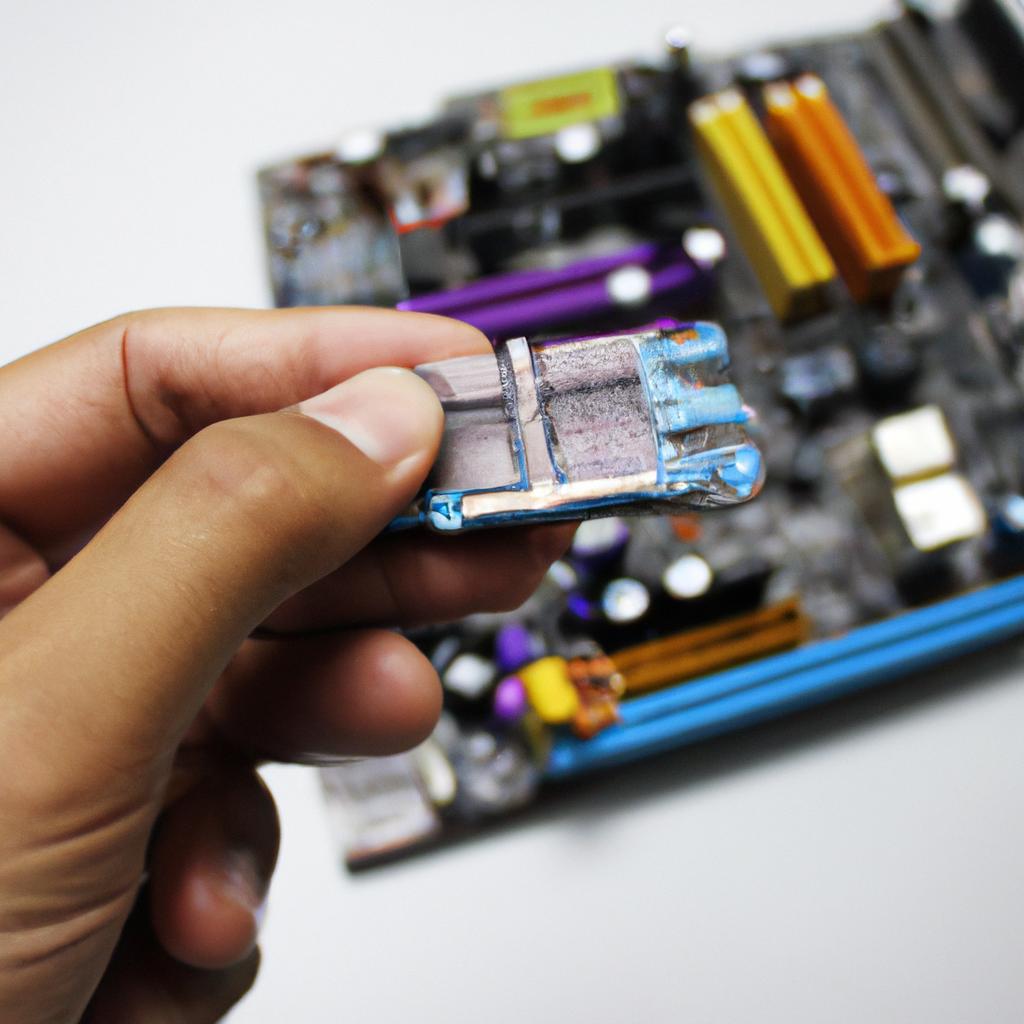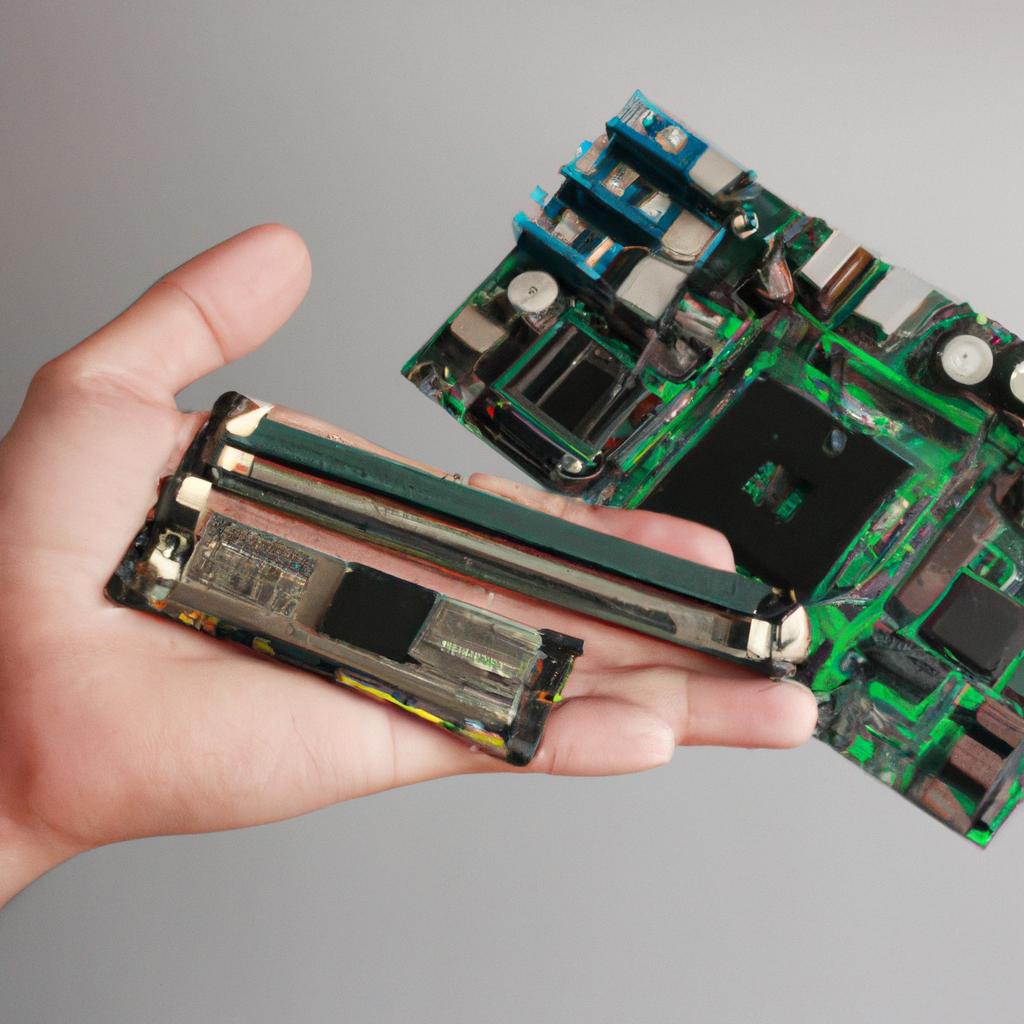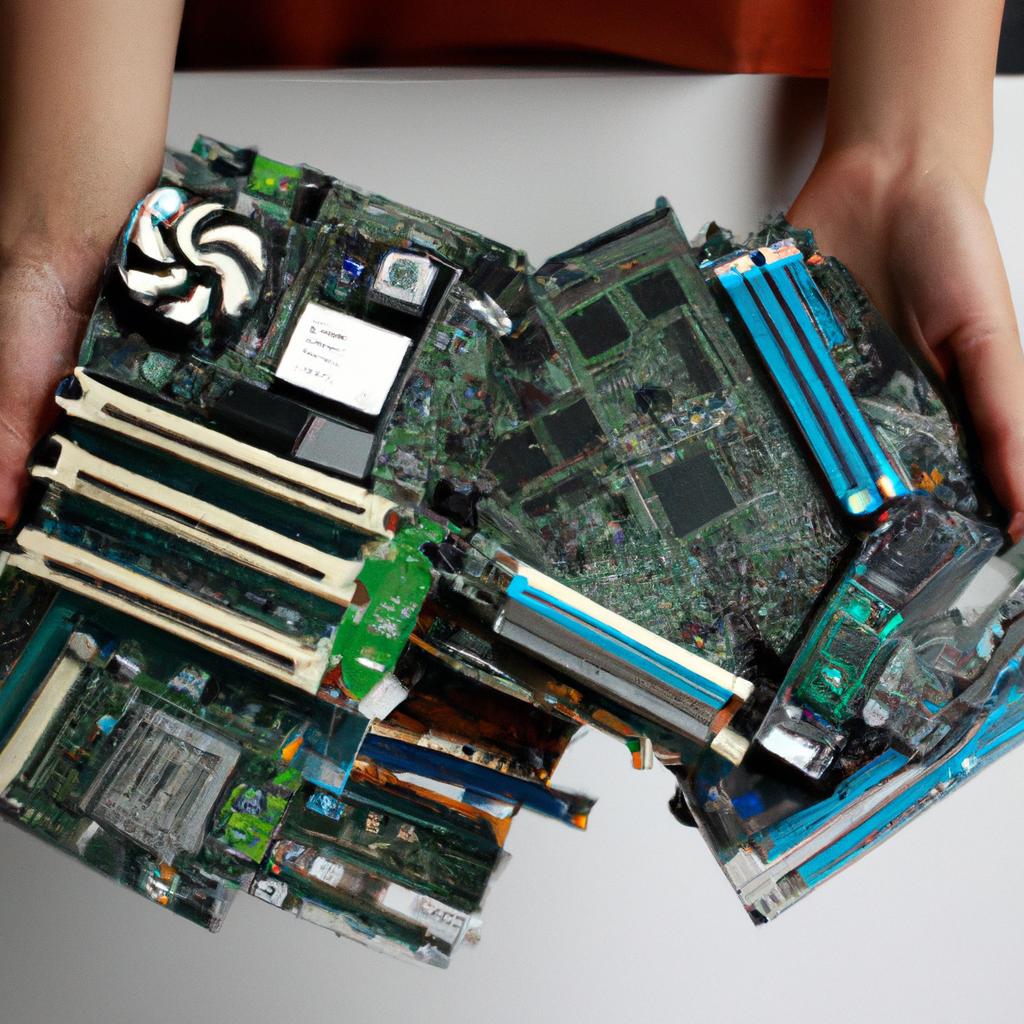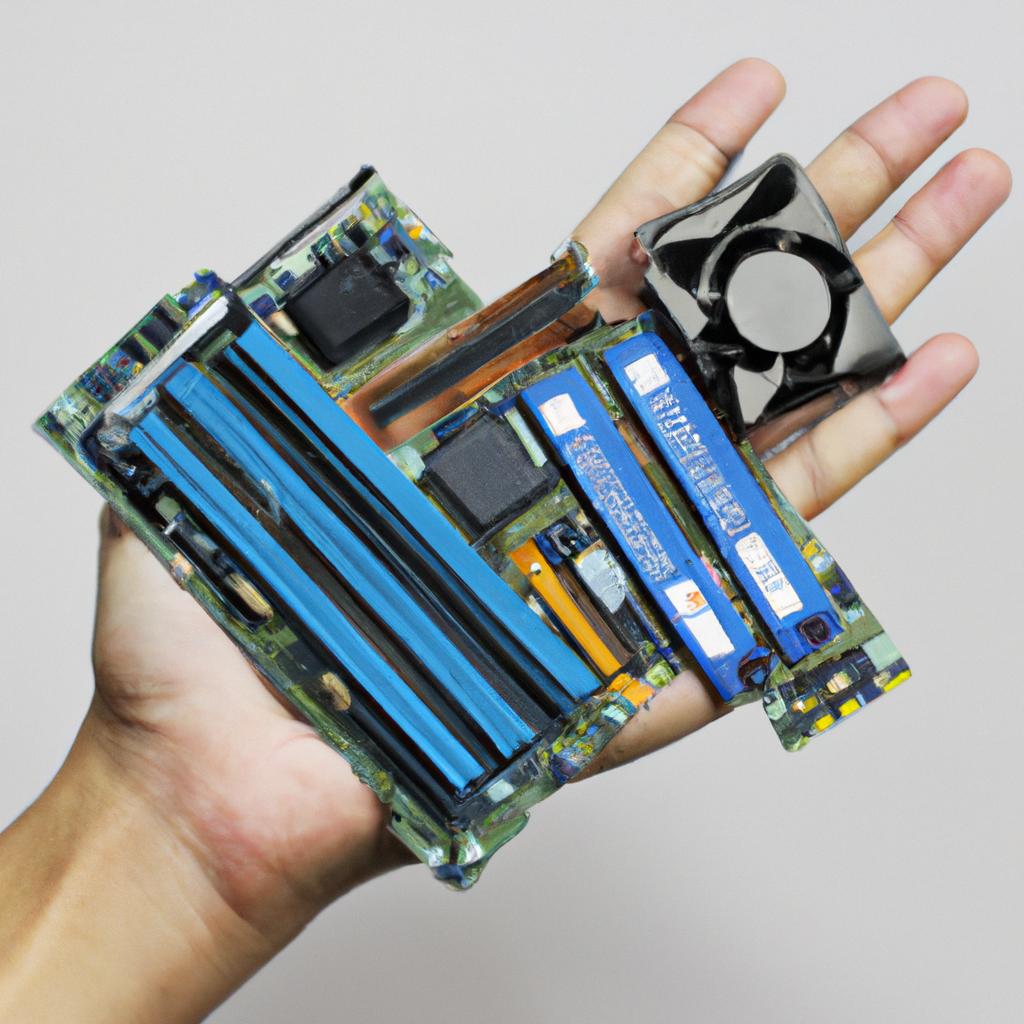Socket AM4: Compatibility in the AMD Platform
In today’s rapidly evolving world of computer hardware, compatibility remains a crucial factor when it comes to selecting and upgrading components. One notable example that highlights this importance is the case study of a tech enthusiast who recently decided to upgrade their existing PC system by replacing their outdated processor with a more powerful one. However, they soon discovered that their chosen processor was incompatible with their motherboard socket, resulting in frustration and wasted resources.
To avoid such scenarios, understanding the concept of compatibility within the AMD platform becomes essential for users seeking to make informed decisions regarding component upgrades. The Socket AM4 serves as a prime illustration of this topic, acting as a key interface between processors and motherboards in AMD-based systems. This article aims to delve into the intricacies of Socket AM4 compatibility, exploring its significance in ensuring seamless integration between various components. By examining factors such as chipset support, BIOS updates, and generation-specific considerations, readers will gain valuable insights into maximizing performance while minimizing potential pitfalls associated with upgrading an AMD-based system.
Socket AM4: An Overview
Socket AM4: An Overview
The Socket AM4 is a computer motherboard socket used by AMD processors. It was first introduced in 2016 and has since become the standard for AMD’s mainstream processors, offering compatibility with a wide range of CPUs. To understand the significance of this socket, let us consider a hypothetical scenario where a user wants to upgrade their processor on an existing system.
Upgrading a processor can be a complex task, involving considerations such as chipset compatibility, power requirements, and physical dimensions. The availability of compatible sockets simplifies this process by providing users with standardized platforms that ensure seamless integration between components. In our hypothetical scenario, the user owns an older generation CPU and wishes to upgrade to one of the latest models released by AMD. The Socket AM4 comes into play here as it supports multiple generations of AMD processors, making it easier for the user to find a compatible CPU without having to change other components or purchase additional accessories.
To further emphasize the advantages of using Socket AM4, we can explore some key features through bullet points:
- Wide Compatibility: Socket AM4 supports various Ryzen processors from entry-level options to high-performance chips.
- Future-proof Design: As new processor models are released by AMD, they will likely continue utilizing Socket AM4, ensuring long-term upgradability.
- Enhanced Performance: With support for technologies like DDR4 memory and PCIe Gen3 connectivity, Socket AM4 allows for improved system performance.
- Cost-effectiveness: Due to its widespread adoption and continued use in newer processors, motherboards supporting Socket AM4 have become more affordable over time.
Additionally, we can illustrate the versatility of this socket through a table showcasing different generations of AMD processors along with their respective compatibility:
| Processor Generation | Supported by Socket AM4 |
|---|---|
| Ryzen 1st Gen | Yes |
| Ryzen 2nd Gen | Yes |
| Ryzen 3rd Gen | Yes |
| Ryzen 4th Gen (upcoming) | Expected |
In conclusion, the Socket AM4 serves as a reliable and future-proof platform for AMD processors. Its wide compatibility, along with its cost-effectiveness and enhanced performance capabilities, makes it an ideal choice for users seeking to upgrade their systems seamlessly. With this understanding of the socket’s advantages, let us now delve into the specific features and specifications offered by the AM4 socket in the subsequent section.
[Transition] Moving forward, we will explore the distinctive features and detailed specifications that make up the AM4 Socket: Features and Specifications.
AM4 Socket: Features and Specifications
As we delve deeper into the world of Socket AM4, it is crucial to understand its compatibility within the AMD platform. To illustrate this point, let’s consider a hypothetical scenario where an individual purchases a new motherboard with a Socket AM4 and wishes to upgrade their processor without having to replace their entire system.
One key advantage of Socket AM4 is its broad compatibility with various generations of AMD processors. This means that users can seamlessly upgrade their CPUs while keeping the same socket, saving both time and money. For instance, if our hypothetical user initially has an entry-level AMD Ryzen 3 processor but desires better performance for demanding tasks such as video editing or gaming, they can easily switch to a more powerful CPU like the AMD Ryzen 7 series without needing to change their motherboard.
To further emphasize the versatility of Socket AM4’s compatibility, here are some notable points:
- Supports multiple memory configurations (DDR4) for enhanced performance.
- Backward compatible with older generation processors for easy system upgrades.
- Provides extensive connectivity options through PCIe Gen3 lanes.
- Offers overclocking capabilities for enthusiasts seeking higher clock speeds.
To provide a clearer overview, let’s take a look at the following table:
| Processor Model | Cores/Threads | Base Clock Speed (GHz) | Max Boost Clock Speed (GHz) |
|---|---|---|---|
| Ryzen 5 3600 | 6/12 | 3.6 | 4.2 |
| Ryzen 7 3700X | 8/16 | 3.6 | 4.4 |
| Ryzen 9 3900X | 12/24 | 3.8 | 4.6 |
In conclusion, Socket AM4 serves as a reliable foundation for upgrading your system over time. Its compatibility across multiple AMD processor generations allows for a seamless transition without the need to replace the entire motherboard. In the subsequent section, we will explore some specific AMD processors that are compatible with Socket AM4, providing you with a comprehensive understanding of this versatile platform.
Next Section: AMD Processors Compatible with Socket AM4
AMD Processors Compatible with Socket AM4
Having explored the features and specifications of the AM4 socket, it is now crucial to understand its compatibility with various AMD processors. By examining a case study on this matter, we can gain a comprehensive understanding of how the AM4 socket functions within the larger framework of the AMD platform.
Case Study Example:
To illustrate the versatility of Socket AM4, let us consider an individual who owns an older motherboard that supports only first-generation Ryzen processors. With a desire to upgrade their system’s performance while keeping costs manageable, they decide to explore whether upgrading their existing motherboard or purchasing a new one would be more beneficial.
- Upgrading Existing Motherboard:
- Cost-effective option
- Requires BIOS update for compatibility
- May limit access to newer features and technologies
- Limited availability of compatible motherboards
| Processor Generation | Compatibility |
|---|---|
| First | Yes |
| Second | Yes |
| Third (Zen 2) | Yes |
| Fourth (Zen 3) | Yes |
In light of our hypothetical case study, it becomes evident that upgrading the existing motherboard might not provide optimal results due to limitations in terms of accessing newer features and technologies; additionally, finding compatible motherboards could prove challenging. Therefore, investing in a new motherboard that natively supports newer generations of Ryzen processors could offer greater flexibility and future-proofing.
Transition into subsequent section about “Motherboards Supporting Socket AM4”:
Understanding which processors are compatible with Socket AM4 is essential when selecting a suitable motherboard. In the following section, we will delve deeper into various motherboards supporting Socket AM4 and explore their unique features and functionalities, allowing users to make informed decisions when building or upgrading their AMD-based systems.
Motherboards Supporting Socket AM4
Transition from the previous section H2: Moving on to the compatibility of AMD processors with Socket AM4, it is important to understand the motherboards that support this socket. By exploring the various options available in the market, users can make informed decisions about their upgrade choices and ensure a seamless integration within the AMD platform.
Motherboards Supporting Socket AM4
To illustrate how Socket AM4 provides flexibility for diverse computing needs, let us consider a hypothetical scenario where an individual wants to build a high-performance gaming system. They decide to invest in an AMD Ryzen processor due to its excellent multi-threaded performance capabilities. In order to fully harness the power of this processor, they need a compatible motherboard that supports Socket AM4.
When looking at motherboards supporting Socket AM4, there are several factors one should consider:
- Form Factor: Motherboards come in different sizes, such as ATX or MicroATX, which determines their physical dimensions. It is essential to select a form factor that fits your desired PC case.
- Chipset Compatibility: Each motherboard has a specific chipset that dictates its features and capabilities. For instance, X570 chipsets offer PCIe 4.0 support while B450 chipsets provide more budget-friendly options.
- Expansion Slots and Connectors: Consider what expansion slots (PCIe) you may require for graphics cards or other add-on components like sound cards or network adapters. Additionally, evaluate the availability of USB ports and SATA connectors required for storage devices.
- Overclocking Support: If you plan on overclocking your CPU or RAM for enhanced performance, check if the motherboard offers robust voltage regulation modules (VRMs) and cooling solutions.
| Form Factor | Chipset | Expansion Slots |
|---|---|---|
| ATX | X570 | 2 x PCIe 4.0 x16 |
| MicroATX | B450 | 1 x PCIe 3.0 x16, 2 x PCIe 2.0 x1 |
| Mini-ITX | X470 | 1 x PCIe 3.0 x16 |
| ATX | B550 | 2 x PCIe 4.0 x16, 1 x PCIe 3.0 x16 |
In conclusion, Socket AM4 offers a wide range of motherboard options for users to choose from based on their specific requirements and preferences. By considering factors like form factor, chipset compatibility, expansion slots, and overclocking support, individuals can find the perfect match for their AMD processors.
Transition to the subsequent section about “Upgrading to Socket AM4: Considerations”: As you contemplate upgrading your system to Socket AM4 and exploring its vast potential, it is essential to consider certain aspects that will ensure a smooth transition and maximize performance. Now let us delve into some key considerations before making this significant step towards an enhanced computing experience
Upgrading to Socket AM4: Considerations
Case Study: Let us consider a hypothetical scenario where an individual is planning to upgrade their existing computer system with the latest AMD platform. They have decided to opt for Socket AM4 and are now faced with the task of determining its compatibility with their current components.
When it comes to motherboard support, not all manufacturers provide compatibility across their entire product lineup. It is essential to carefully research and select a motherboard that explicitly supports Socket AM4. Checking the manufacturer’s website or consulting technical experts can help identify compatible options.
In addition to motherboards, other crucial considerations include CPU compatibility and memory support. With Socket AM4, users should ensure that the chosen processor is designed for this particular socket type. Different generations of processors may require different versions of BIOS firmware on the motherboard for proper functionality. Furthermore, verifying memory compatibility ensures smooth operation by ensuring that the RAM modules are supported and can run at optimal speeds.
To simplify these compatibility considerations, here are some key points:
- Motherboard selection: Choose a model explicitly supporting Socket AM4.
- Processor compatibility: Ensure that the selected CPU is designed for use with Socket AM4.
- BIOS updates: Check if any necessary firmware updates are available for your specific motherboard model.
- Memory support: Verify that your preferred RAM modules are compatible with both the motherboard and CPU.
To illustrate further, let’s take a look at a comparative table showcasing three popular motherboards’ compatibility with Socket AM4 CPUs:
| Motherboard Model | CPU Support | Memory Support |
|---|---|---|
| XYZ Gaming | Supports Ryzen 3000 series | DDR4 up to 3600MHz |
| ABC Pro | Compatible with Ryzen APUs | DDR4 up to 3200MHz |
| DEF Ultra | Works with Ryzen 5000 series | DDR4 up to 4000MHz |
Considering the compatibility factors mentioned above and evaluating specific components’ support, users can make informed decisions regarding their system upgrade. By aligning motherboard, processor, memory, and other components with Socket AM4 compatibility, they ensure a seamless experience on the AMD platform.
Looking ahead to the future of Socket AM4 in the AMD Platform…
Future of Socket AM4 in the AMD Platform
In the previous section, we discussed the various considerations when upgrading to Socket AM4. Now, let us delve deeper into the compatibility of Socket AM4 in the AMD platform. To illustrate this further, let’s consider a hypothetical case study.
Imagine that you have a computer system with an older generation processor and motherboard. You are looking to upgrade your system for better performance and enhanced features. In this scenario, migrating to Socket AM4 can be an excellent choice as it offers improved compatibility with newer AMD processors.
One key advantage of Socket AM4 is its broad range of compatibility across different generations of AMD processors. This means that even if you have an older generation CPU, you can still use it on a motherboard with Socket AM4 by simply updating the BIOS. This flexibility allows users to take advantage of new technologies without having to replace their entire system.
- Support for higher core count CPUs: With Socket AM4, you can easily upgrade to processors with more cores and threads, enabling faster multitasking and smoother performance.
- Enhanced power efficiency: The latest AMD processors designed for Socket AM4 offer improved power management capabilities, resulting in lower energy consumption and reduced heat output.
- Compatibility with DDR4 memory: Socket AM4 supports DDR4 memory modules, providing faster data transfer rates compared to earlier generation motherboards.
- Future-proofing your setup: As AMD continues to release new processors compatible with Socket AM4, investing in this platform ensures long-term upgradability options.
To provide a concise overview of the technical specifications and support provided by different generations of AMD processors compatible with Socket AM4, here is a table illustrating their key features:
| Processor Generation | Number of Cores | Clock Speed (GHz) | Cache Size (MB) |
|---|---|---|---|
| Ryzen 3 | 4 | Up to 4.0 | 8 |
| Ryzen 5 | 6 | Up to 4.2 | 16 |
| Ryzen 7 | 8 | Up to 4.9 | 32 |
| Ryzen Threadripper | Up to 64 | Up to 4.5 | Up to 256 |
In summary, Socket AM4 offers a versatile and future-proof platform for upgrading your computer system. Its compatibility with various generations of AMD processors allows users to take advantage of new technologies without the need for an entirely new setup. With support for higher core counts, enhanced power efficiency, DDR4 memory compatibility, and long-term upgradability options, Socket AM4 provides a solid foundation for building a high-performance system.




